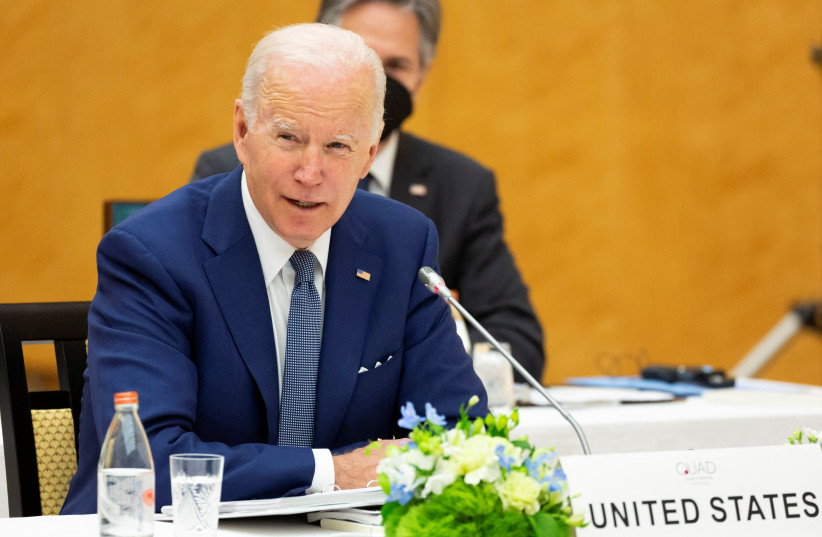As the US tries to confront potential aggression by China in Asia and seeks to roll back the Russian invasion of Ukraine, it must increasingly lean on partners and allies. This is what was lacking in the 1990s and early 2000s.
The United States’ “go it alone” approach in Iraq in 2003, despite the supposed “coalition of the willing,” led to resentment against the Americans. Now, the EU has stepped up in Europe to help Ukraine. With appeasers such as Angela Merkel out of power, European countries are able to stand up to Russia.
In Asia, different factors are at work. US President Joe Biden’s meeting with the “Quad” countries of India, Australia and Japan in Tokyo on Tuesday is now the symbol of US relationships and power in a multi-polar world. This matters for Israel because Jerusalem can also work closely with the Quad countries as part of its close relationships with important nations in Asia.
What does this mean?
Multipolar means that the world has moved on from US global hegemony and the new world order of the 1990s. It means that the US can’t do humanitarian intervention and preemption anymore. It means that the rules-based international liberal world order is fading and weakening because countries such as Russia, China, Iran and Turkey are undermining it.

To stop the underminers, the US must work with major democracies. That means NATO countries, except for Turkey, as well as the EU and nations that are part of the Five Eyes network.
In Asia, it means Japan, South Korea and Australia, as well as the powerhouse India. India has been problematic from the US lens recently because it has not taken a tough stance on Ukraine. That means India has played both sides with the Russian camp.
Why is India flirting with Russia?
First of all, India was part of the nonaligned movement and was historically closer to Russia for many reasons, including the legacy of imperialism and colonialism India had to deal with.
Today, India is closer to the West, but it also has a right-leaning government that has been more critical of some of the liberal tendencies of Western democracies.
India is close to the UAE and Israel these days. The UAE, like other Gulf countries, has also wondered about what the new US stance will bring globally. This is because the US keeps shifting its stance on Iran and also on how to deal with the international community.
Is the US pushing democracy, is it appeasing dictators, and is it leaving the Middle East? Is the US working with China to pave the way for globalization, as it did in the late 1990s and early 2000s, or is it against China?
America first or better?
Is the US “American first” and leaving the world to become Hobbesian world order as some on Trump’s team envisioned? Or is the US “back” as Biden asserts?
With Biden’s first trip to Asia we are seeing evidence that the US is “back.” That means Biden has promised support for Taiwan.
The Quad is now becoming more assertive. The US is also working with Australia on submarine deals. However, that has angered France.
There is now new leadership coming to power in Australia. What that might mean for the Quad is unclear. What is clear is that Japan, India and Australia are increasingly modernizing their militaries and arming themselves. They must gird themselves for potential conflict in Asia.
Fortress China
China, meanwhile, is shutting itself off. It is becoming more closed to the world, critical of foreign travel and even critical of Chinese companies doing business on Wall Street. That means China could be preparing for a conflict in which it is now weaned off the international order.
That means cutting itself off from Western social media. If it can call home its foreign students and companies that rely on Western investment, it can insulate itself from the kind of sanctions Russia has faced. Clearly, China knows this.
Among the issues that the Quad is looking at are these potential tensions. That means issues also relating to North Korea and Ukraine, as well as a new security agreement China has pushed with the Solomon Islands.
“The top leaders are gathering for the fourth time – they have already met once in Washington last September and twice virtually – in less than two years,” the BBC reported. “That underscores the importance of the Quad, which was largely just a concept until 2017.”
Indeed, it is clear that Biden wants to lean into the Quad as an example of how the United States can shape world order today as the Americans confront a multipolar world and a China and Russia that want to upset the US-led global order.
While the previous US administration was circumspect about this global order, the new administration is not. Some on the far-Right oppose these partnerships. They claim that “neocons” and “Never Trumpers” are pushing the US into a hawkish policy that might lead to conflict with nuclear-armed Russia and China.
The reality is that the US needs the Quad, and the Quad is the real foundation stone of US policy in the upcoming decades of this century. As the US tries to make its way in a complex new world order, it must hang on to these countries.
At the same time, Israel and US partners in the Middle East want to work closely with Japan, South Korea, Australia and India as well. These are natural partners, and they are existing partners, much as Singapore, the Philippines and other states have been for Israel.
